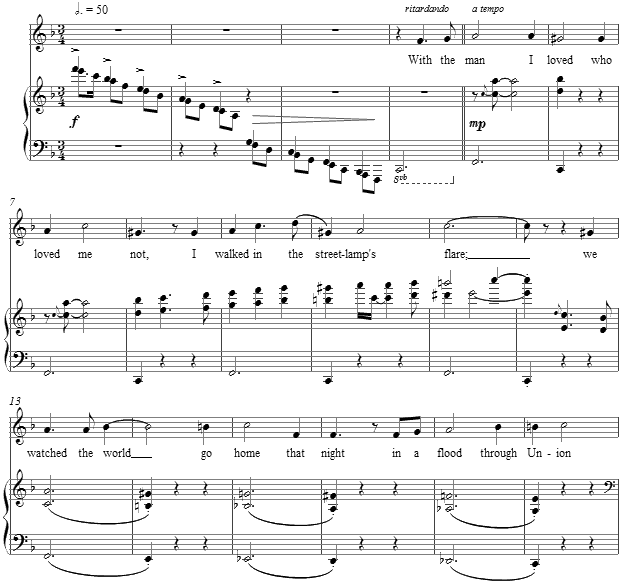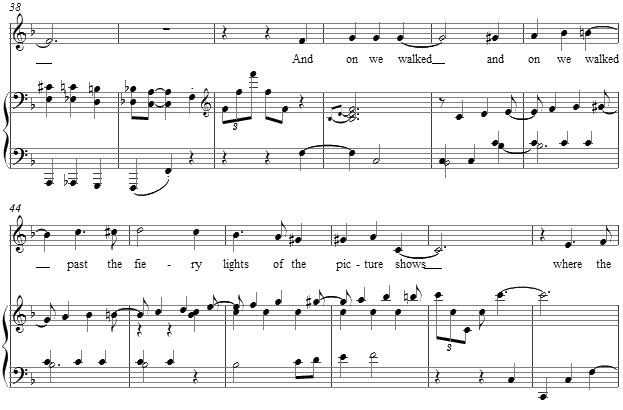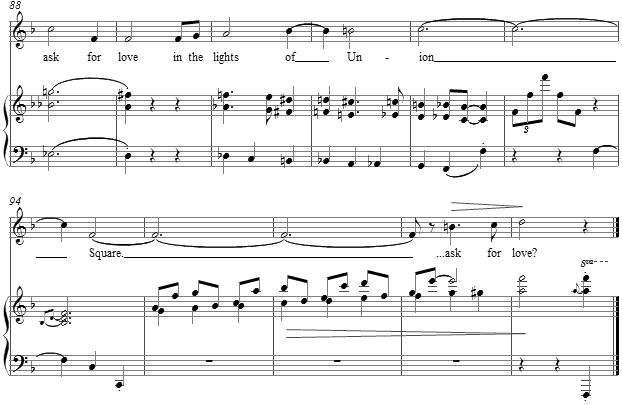Music and Texts of GARY BACHLUND
Vocal Music | Piano | Organ | Chamber Music | Orchestral | Articles and Commentary | Poems and Stories | Miscellany | FAQs
Union Square - (2008)
Sara Teasdale
for mezzo soprano and piano
With the man I love who loves me not,
I walked in the street-lamps' flare;
We watched the world go home that night
In a flood through Union Square.
I leaned to catch the words he said
That were light as a snowflake falling;
Ah well that he never leaned to hear
The words my heart was calling.
And on we walked and on we walked
Past the fiery lights of the picture shows --
Where the girls with thirsty eyes go by
On the errand each man knows.
And on we walked and on we walked,
At the door at last we said good-bye;
I knew by his smile he had not heard
My heart's unuttered cry.
With the man I love who loves me not
I walked in the street-lamps' flare --
But oh, the girls who ask for love
In the lights of Union Square.[ 4 pages, circa 2' 10" ]
Sara Teasdale
As with the small cycle, New York Sorrows, one underlying theme of Sara Teasdale is the loss of love, or in this instance unrequited love. Her lyricism is of a period in time associated with the early 1900s and her mention of place names in and around New York wonderfully roots her in time and place. Therefore, this setting has a sense of the "antique" in which an earlier era is evoked.
After an aggressive gesture falling dramatically from high to low, the first verse of this hymn-like poem begins, spiced with the raised second added to the scalar elements of both vocal line and accompaniment.
After two verses, the third and fourth stanzas become a bridge for this song form, in which a rising line is indicative, in part, of that human penchant for looking yet again for new possibilities within the context of loss. The repetition of the verb, walk, indicates motion, even if in "spinning one's wheels."
The coda which follows a final verse rises as the antithesis of the opening gesture, and the short quote from an earlier line is turned into from a statement into a question. Should we continue to look for love? Teasdale's answer is clear to me, as she suggests a further search for love. Her most popular publication was the 1917 Love Songs, in spite of her suicide at the end of her young life. That anthology of poetry won for her both the Poetry Society of America Prize and the Columbia University Poetry Society Prize (which became the Pulitzer Prize for poetry), indicating clearly that such optimism in love is at the minimum "popular."
The score for Union Square is available as a free PDF download, though any major commercial performance or recording of the work is prohibited without prior arrangement with the composer. Click on the graphic below for this piano-vocal score.



